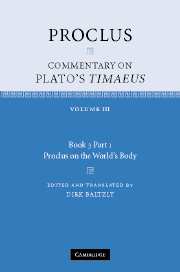III - The Third Gift of the Demiurge: A Whole of Wholes
Published online by Cambridge University Press: 30 June 2022
Summary
The composition of the world took up the entirety of each [lit. ‘one whole each’] of the four elements. The builder built it from all the [kinds of] fire, water, air and earth there are, and left no part or power of any of them external to it. (32c5–8)
Theoria
These words relate to what we said earlier (50.16) – that Plato knew that there are many different [grades of] fire and water and the other elements, out of all of which the cosmos has been composed. This is the third demiurgic gift to the cosmos. So we ought not to be surprised if he leaves the highest grades of the four elements in the heavens, the middle grades in the region below the moon and the final dregs in the region below the earth (49.12), distributing the elements in a manner analogous to the three demiurges, referring these to Zeus, Poseidon and Pluto respectively. For in each case, the whole of them is received and the universe is [composed] out of all of each one. [This is so] whether you speak about the first and celestial fire, or the middle [gradation of fire] or the final and discordant kind which is merely tinged with certain fiery qualities. For whatever we suppose discord and disorder to be, each of the elements below the earth surely manifests this sort of nature. This is because when creation proceeds, after a short while it tails off into that which is unordered (to akosmêton) and that which participates in order to the least degree. These things, then, are all cleared up.
We say that when Plato writes that the builder left no part or power of any of them external to it there are two different things at issue. A part of one of the elements is of the same sort of substance as the whole element of which it is a portion, but a power completes each of the elements. So, a part of [the totality of] fire is fire, but a single power is one of the many defining features of fire – the power of movement or the power of sharpness or the power of tenuousness. From these powers there results one single fire, and all the [kinds of] fire and all the powers of fire and of the other elements are included in the cosmos.
- Type
- Chapter
- Information
- Proclus: Commentary on Plato's Timaeus , pp. 109 - 124Publisher: Cambridge University PressPrint publication year: 2007

